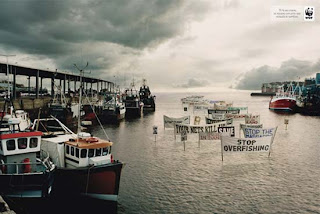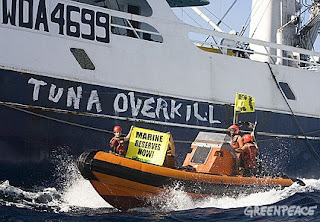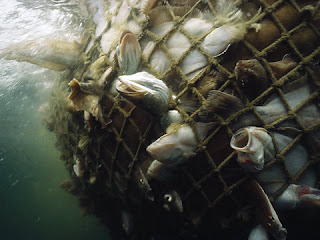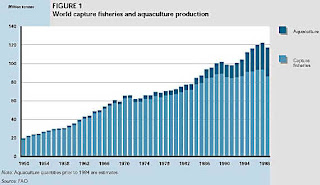If you wish to learn more about overfishing, please visit the following links that I have provided below:
Saturday, May 30, 2009
Who is addressing this problem? What can we do to help?
 There are many people who are trying to solve the problem of overfishing. One particular group, called Green Peace, is making an extra effort. They are working on international relations trying to make agreements between different governments, hopefully leading to more rigid and strict rules out at sea. Some local ways of helping to stop overfishing include eating fish that are not as vulnerable to becoming completely exploited and teaching others about the worldwide issue.
There are many people who are trying to solve the problem of overfishing. One particular group, called Green Peace, is making an extra effort. They are working on international relations trying to make agreements between different governments, hopefully leading to more rigid and strict rules out at sea. Some local ways of helping to stop overfishing include eating fish that are not as vulnerable to becoming completely exploited and teaching others about the worldwide issue.The photo shown is of a port in France. This port is attempting to spread the knowledge of the problem by telling people to stop overfishing.
Source:
http://www.greenpeace.org/australia/issues/overfishing/our-work
Source of picture:
http://www.joelapompe.net/wp-content/uploads/2008/12/manif2008.jpg
What is currently being done to adress the problem? Is it working? What progress has been made? What more is there to do?
 There are a lot of things that are being done in an attempt to stop or slow down overfishing. People have suggested to set laws stating thatn you are not allowed to catch certain species of fish, which would help to get the population of these fish back up. There are a lot of other things that we can do to address this problem. Among these solutions is setting up marine reserves. Marine reserves are areas in the ocean that are closed off to fishing and other outside forces. Marine reserves allow fish to live in safety and hopefully reproduce. Besides setting up marine reserves, there are many other things we can do to help solve this problem.
There are a lot of things that are being done in an attempt to stop or slow down overfishing. People have suggested to set laws stating thatn you are not allowed to catch certain species of fish, which would help to get the population of these fish back up. There are a lot of other things that we can do to address this problem. Among these solutions is setting up marine reserves. Marine reserves are areas in the ocean that are closed off to fishing and other outside forces. Marine reserves allow fish to live in safety and hopefully reproduce. Besides setting up marine reserves, there are many other things we can do to help solve this problem.The above photo shows the Green Peace group promoting marine reserves in order to stop overfishing, which is gradually depleting the world's supply of tuna.
Sources:
http://www.un.org/events/tenstories/06/story.asp?storyID=800
http://www.greenpeace.org/australia/issues/overfishing/solutions
http://www.greenpeace.org/australia/issues/overfishing/solutions/political/marine-reserves
Source of picture:
http://www.greenpeace.org/raw/image_full/international/photosvideos/photos/greenpeace-activists-take-acti-3.jpg
What are the potential consequences of not adressing the problem?
Overfishing is a rapidly growing problem that needs to be addressed. If this problem is continued to be condoned, it can potentially lead to many devastating things. One person out of every five people rely on fish to get the necessary amounts of protein in their diets. Over two million people depend on fish. However, about 70% of all the species of fish in the world are gradually becoming depleted or already are depleted. Over time, overfishing may end the world's supply of fish. Humans will not be the only people that suffer from this though. The diets of many aquatic creatures consist largely of fish. The population of these fish-eating animals might begin to decline, leading to disrupted trophic levels. Since so many people eat fish, the price of this product has been increasing at a very fast rate. Soon enough, the price of fish will extremely expensive. Then, not only will there be a small amount of fish to eat, it will also be sold at a very high price.
Source:
http://www.un.org/events/tenstories/06/story.asp?storyID=800
Source:
http://www.un.org/events/tenstories/06/story.asp?storyID=800
Tuesday, May 26, 2009
What are the causes of overfishing?
There are a number of causes to the worldwide problem of overfishing. A large problem is that oceans are beginning to run ou t of fish. So, fishing companies are beginning to travel to more distant areas to catch more fish. In time, all the oceans may be depleted of fish. Also, the needs for fish are beginning to grow. For example, the producers of certain fish, such as tuna, are starting to change the way they produce their products. This adds more diversity and perhaps a better taste to their tuna. Because of this, the consumption of tuna is beginning to grow, leading to the need of more fish, which eventually leads to overfishing. People are creating new fishing
t of fish. So, fishing companies are beginning to travel to more distant areas to catch more fish. In time, all the oceans may be depleted of fish. Also, the needs for fish are beginning to grow. For example, the producers of certain fish, such as tuna, are starting to change the way they produce their products. This adds more diversity and perhaps a better taste to their tuna. Because of this, the consumption of tuna is beginning to grow, leading to the need of more fish, which eventually leads to overfishing. People are creating new fishing
techniques, as well as using new technology, to help them catch more fish than before.
 t of fish. So, fishing companies are beginning to travel to more distant areas to catch more fish. In time, all the oceans may be depleted of fish. Also, the needs for fish are beginning to grow. For example, the producers of certain fish, such as tuna, are starting to change the way they produce their products. This adds more diversity and perhaps a better taste to their tuna. Because of this, the consumption of tuna is beginning to grow, leading to the need of more fish, which eventually leads to overfishing. People are creating new fishing
t of fish. So, fishing companies are beginning to travel to more distant areas to catch more fish. In time, all the oceans may be depleted of fish. Also, the needs for fish are beginning to grow. For example, the producers of certain fish, such as tuna, are starting to change the way they produce their products. This adds more diversity and perhaps a better taste to their tuna. Because of this, the consumption of tuna is beginning to grow, leading to the need of more fish, which eventually leads to overfishing. People are creating new fishingtechniques, as well as using new technology, to help them catch more fish than before.
The photo to the above depicts the global issue that which is overfishing.
Source:
http://www.greenpeace.org/australia/issues/overfishing/overview/causes
Source of picture:
http://www.sea-way.org/blog/Overfishing01.JPG
Source:
http://www.greenpeace.org/australia/issues/overfishing/overview/causes
Source of picture:
http://www.sea-way.org/blog/Overfishing01.JPG
What is overfishing? What is the problem? Is overfishing worldwide or concentrated in particular regions?
The term “overfishing” basically describes itself. Overfishing is when fishers catch more fish than needed. Overtime, overfishing can lead to a depletion of fish, which, in turn, leads to the extinction of animals that eat fish. Animals, such as penguins, will not have enough food to survive and eventually they will die out. Also, the equipment used by fishers has a detrimental effect on the animals in the ocean. It may accidentally harm the animals that they are not trying to catch. Overfishing is a global issue that is going on today.
Source:
http://overfishing.org/pages/what_is_overfishing.phphing.php
The picture below is a chart of the number of fish captures in the world. The chart starts at the year 1950 and ends at 1998, with four year intervals. As you can see from the chart, the number of fish being captured gradually increases; a sign of how overfishing has gradually been becoming more and more eminent around the world.
Source of picture:
http://see-the-sea.org/topics/commerce/World_captureandAquaculture_production.jpg

Source:
http://overfishing.org/pages/what_is_overfishing.phphing.php
The picture below is a chart of the number of fish captures in the world. The chart starts at the year 1950 and ends at 1998, with four year intervals. As you can see from the chart, the number of fish being captured gradually increases; a sign of how overfishing has gradually been becoming more and more eminent around the world.
Source of picture:
http://see-the-sea.org/topics/commerce/World_captureandAquaculture_production.jpg

Subscribe to:
Comments (Atom)